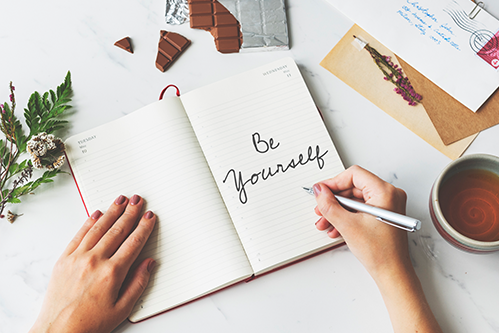
Believe in Yourself, Warts and All, and Manifest that Belief in Your Daily Life
You deserve your place on this planet along with the others who are imperfect as well. If you do not believe this, try Olga Khazan’s advice, “Instead, try talking to yourself like you would your best friend.” (Olga Khazan, Why Self-Compassion Works Better Than Self-Esteem, The Atlantic)
Carl Richards, “Will you try something with me? Grab a blank piece of paper, draw a line right down the middle and think of the last time you saw someone fail. It might take you a minute to remember. Got it? Now, on the left side of the paper, write down a few words describing how that failure made you think about that person.
Now, I want you to think about the last time you failed. I bet it won’t take nearly as long to recall. On the right side of the paper, jot down a few words describing how that failure made you think about yourself.
Finally, compare the two. If you’re like me, you probably had one or both of the following things happen:
1. When you tried to remember someone else’s failure, you couldn’t. But when you thought of your own, you had a laundry list of recollections.
2. The left side, where you considered that other person, had words like compassion, courage and bravery. The right side had words like shame and stupidity.
Isn’t it interesting that when others fail, we tend to admire them for trying? Yet when we fail, we beat ourselves up for the very same thing. Not only that, but isn’t it also amazing how quickly we forgive and forget other people’s mistakes and how long we hold onto our own?
Are you cool with this? Because I’m not.
Something needs to change, and it’s not the part about how forgiving we are of others’ failures.
Try a Little Grace
Stop beating yourself up about your failures.” (Carl Richards, We See Others’ Failures as Courageous. We See Our Own as Shameful. Why? The New York Times)
Ruth Whippman’s story, “In a particularly low moment a few years back, after arriving friendless and lonely from Britain to live in the United States, I downloaded a “happiness app” onto my phone. It was surprisingly hard to choose one. There were close to a thousand bliss-promising options in the app store- ones that would teach you to meditate or be grateful, or that would send you photomontages of sunsets and puppies or unfeasibly flattering shots of your loved ones (giving you a moment to temporarily ignore your actual, less attractive loved ones.)
The app I eventually chose messaged me every hour or so with a positive affirmation that I was supposed to repeat to myself over and over. “I am beautiful,” or “I am enough.” The problem was, every time my phone buzzed with an incoming message, I would get a Pavlovian jolt of excitement thinking an actual person was trying to contact me. “I am enough,” I would snarl bitterly upon realizing the truth, unable to shake the feeling that, without friends or community, I really wasn’t.” (Ruth Whippman, Happiness Is Other People, The New York Times)
Try self-compassion
Olga Khazan, “So what is self-compassion? How is it better?”
Kristin Neff, a psychology professor at the University of Texas, “It means treating yourself with the same kind of kindness, care, compassion, as you would treat those you care about—your good friends, your loved ones.
One component is self-kindness, which is in a way the most obvious. But it also entails a recognition of common humanity—in other words, the understanding that all people are imperfect, and all people have imperfect lives. Sometimes, when we fail, we react as if something has gone wrong—that this shouldn’t be happening. “I shouldn’t have failed, I shouldn’t have had this issue come up in my life.” And this sense that “this shouldn’t be happening,” as if everyone else in the world were living perfectly happy, unproblematic lives. That type of thinking really causes a lot of additional suffering, because people feel isolated and separated from the rest of humanity.
So, when we have self-compassion, when we fail, it’s not “poor me,” it’s “well, everyone fails.” Everyone struggles. This is what it means to be human. And that really radically alters how we relate to failure and difficulty. When we say, “Oh, this is normal, this is part of what it means to be human,” that opens the door to grow from the experience. If we feel like it’s abnormal, this shouldn’t be happening, then we start blaming ourselves.” (Kristin Neff Interviewed by Olga Khazan, Why Self-Compassion Works Better Than Self-Esteem, The Atlantic)
Talk therapy will help. It is called Cognitive Behavioral Therapy- “Cognitive Behavioral Therapy (also known by the abbreviation as CBT) is described by fellow mental health professional, Ben Martin Psy.D of Psyche Central as a short-term, goal-oriented psychotherapy treatment that takes a hands-on, practical approach to problem-solving.
Most professionals, would agree, its goal is to change patterns of thinking or behavior that are behind people’s difficulties, and so change the way they feel.” (Matthew Hunt, Cognitive Behavioral Therapy in a Nutshell, http://counseling.staging.wpengine.com/counseling/cognitive-behavorial-therapy-nutshell/)
This is where Counseling on Demand comes in.
We are online at www.CounselingonDemand.com.
Effective Online Counseling…Only a Click Away